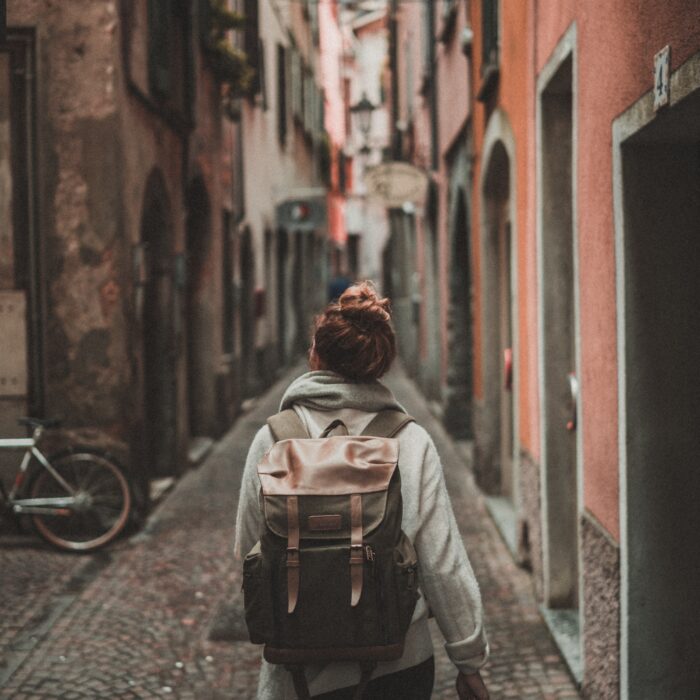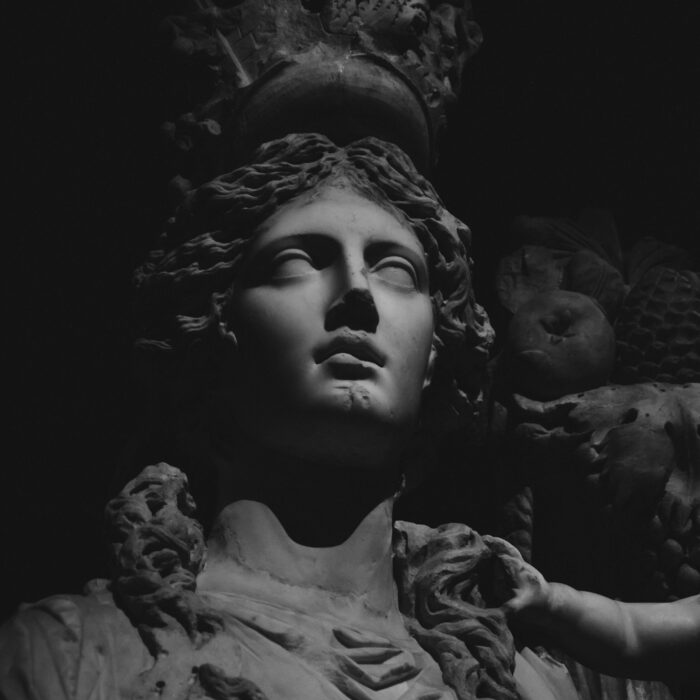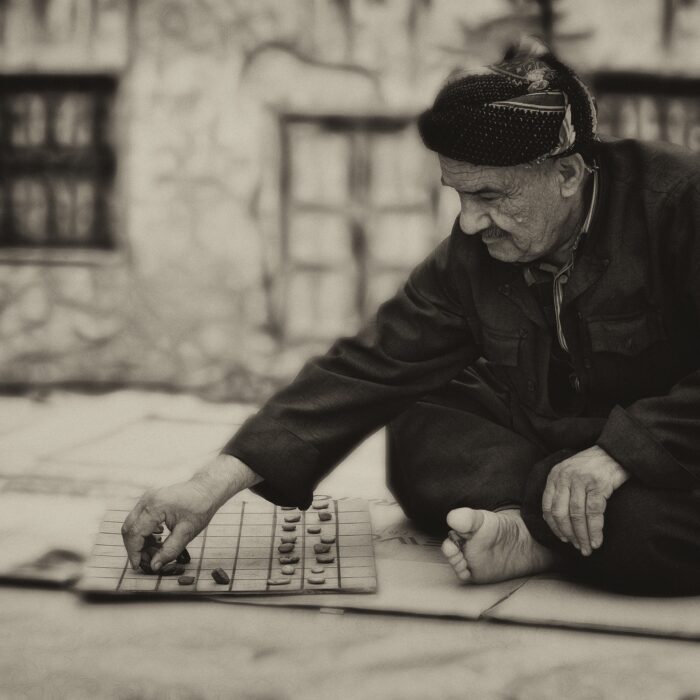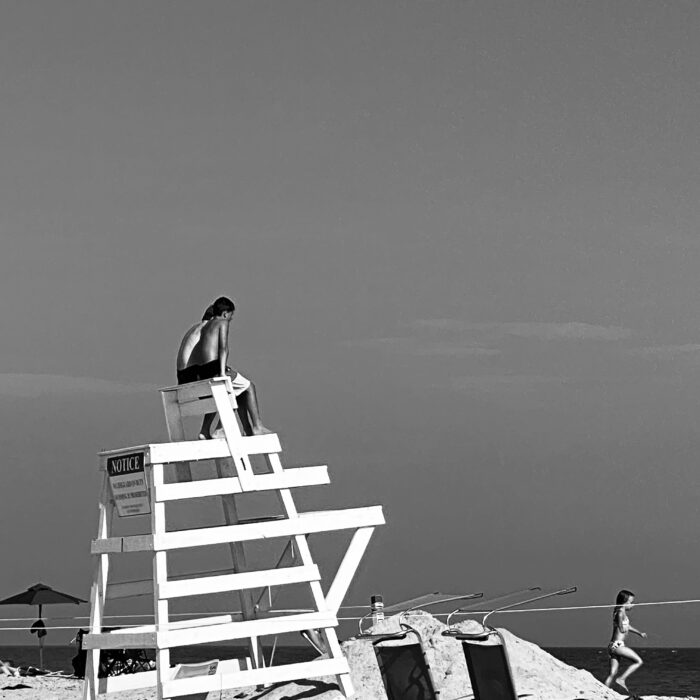You have no items in your cart. Want to get some nice things?
Go shopping Imagine this: The sky is a cylinder of blue. You are sure it goes on forever. You are sure this moment will go on forever, when you turn your gaze from the cleanest of skies to her prone, motionless body, although, on closer inspection, you see her chest rising and falling with every second of life that runs through her, and you stare in an admixture of awe and disbelief, unsure if this existence is truthful, wondering if this is but another possibility in the multiverse, and there, if you blink, you miss the edge of her lips’ pull towards her cheeks, the mouth opening, the teeth on show, contagious, and like the most pleasant of diseases, you do so too, unsure if she is looking back at you behind dark lenses, or if she feels the warmth of your stare.
Imagine this: The sky is a cylinder of blue. You are sure it goes on forever. You are sure this moment will go on forever, when you turn your gaze from the cleanest of skies to her prone, motionless body, although, on closer inspection, you see her chest rising and falling with every second of life that runs through her, and you stare in an admixture of awe and disbelief, unsure if this existence is truthful, wondering if this is but another possibility in the multiverse, and there, if you blink, you miss the edge of her lips’ pull towards her cheeks, the mouth opening, the teeth on show, contagious, and like the most pleasant of diseases, you do so too, unsure if she is looking back at you behind dark lenses, or if she feels the warmth of your stare.
Regardless, you are sure you hear her eyes crinkle and shimmer as they do when she is joyous. You look back to the sky. There’s not a cloud in sight.
*
A sobering glimpse: In the not so distant future, you will be driving a rental car, at speed, along a dirt track designed for pedestrians and bikes. Sophia Garcia is in the passenger seat. She is glamorous, and everything you want, but perhaps not everything you need. She is freedom, liberty, and hope, wrapped in a fierce, uncompromising package. She is also not the woman you think you love. At that moment, she will have been partying for two days straight, and will be at the height of an acid trip.
“Sophia, I’m driving,” you say, as she reaches for the inside of your thigh, your foot jolting, five extra miles per hour in the death mobile.
“And I am exploring another possibility in the multiverse,” she says, working her way up.
You will swallow. You will not stop her, but something in you, which has not yet been rendered ignoble, will delay.
“And which reality is that?”
“The one in which this ends very badly.”
*
A great sea mist rolls in and threatens to ruin everything.
“You’re being dramatic,” she says.
“Literally, everything.” You pause and gaze at the impenetrable wall of cloud. “This is the worst thing that could have happened.”
She bites her lip in an attempt to keep a giggle escaping her mouth. She fails, but does not fail to catch the flash of hurt on your face, before you retreat inside yourself, a mollusc in predatory danger.
She turns to look at you, but you don’t look back, no, straight ahead, because you want her to pry, want her to dig into the nature of your condition. Why are you being like this? How did you get here?
“What?” she asks. A shake of the head.
“Come on.” Creeping towards you, inch by inch. A wry smile on her face, like a child who knows they are getting their way. Her cheek next to yours. Hesitating, brief, before kissing the corner of your mouth and working her way round. You kiss her back because you know it will make her happy. You tend to do this a lot of late, things that will make her happy. You are sure, by consequence, you too, will experience some sort of pleasure.
“I wanted it to be perfect.”
She shakes her head and grins, raising her eyebrows. Saying so much with so little.
As she rolls away from you, she stands to stretch her short, graceful dancer’s body, a haunting she will never escape (nurture having fought with nature, and won). You follow her gaze to a group of small children performing cartwheels in the sand, again and again. They stop and giggle with the dizziness. Her mouth opens and her faces changes to something you have not seen before. It bypasses pleasure, grazing fear and excitement on the way. Joy. This must be joy.
*
An excellent writer, speaking on joy, said, “The thing no one ever tells you about joy is that it has very little real pleasure in it.” In the same piece, she quoted another esteemed figure: “It hurts as much as it is worth.” Take from this what you will.
*
There is no polite way to say this, and actually, the distinction must be made clear: you fuck her. Usually, you would make love, in a tender, safe way. Feeling your way around familiar turns and twists, not here, but there. Today is different. Today is two fumbling teenagers, unknowing that this is not the last time. Soft, silent gasps escape her mouth. She steadies herself against walls, hunched over the sink, as if this will make a difference. You push harder and harder, and then, as it comes, it goes; that brief moment where two are one, and, if one is lucky, are of longer of this world.
You think about this for a moment. Other worlds. Better places. Fleeting. And yet, would you want to have constant pleasure? Can one have too much? Would this thing we long for become sickly, addictive, dangerous?
“Coming?”
You exit the toilet of the barbecoa and return to lunch.
*
“Deep. I dunno.” She shrugs and smiles before pronging a cube of meat on her fork. She waves it like a conductor’s baton, before guiding it towards her mouth.
In the end, you didn’t mix your words.
“I mean, I’d be lying if I wasn’t broody. Often. It’s like…” She shrugs again, and looks into the distance. “When I was younger, a teenager, all the women in my family primed me for this life of marriage, followed by childrearing, which goes hand in hand with martyrdom, after all, that’s what motherhood is—”
“Pardon?”
“Oh, come on, we must have had this conversation.”
“Never. Not sober.”
“The way you go on about it, you make us out to be alcoholics.”
You eye the bottle of red wine, and make a show of checking your watch. “It’s two p.m., and we are one bottle down. We have a problem.”
She laughs and your stomach skips like sickness.
“Anyway, motherhood, is like, the ultimate sacrifice. Right from the beginning.” A sip of wine. “First we ruin our carefully sculpted bodies by trying to squeeze a bowling ball out of a gap which, frankly, does not accommodate a bowling ball. It’s never the same. Or so I hear. Then you spend nine months or so, having your nipples chewed off, taking involuntary night-time walks. And that is year one. Just think of the angst of releasing your child into the world, not knowing if they will return—”
You snort. “Where are you planning to live?”
“And then, you know, you have to think of the influence you have on this human being you’ve been entrusted with.”
“You make it sound like a job.”
“But it is a job, twenty-four hours a day, seven days a week, and so on. You cannot tell your child that you need a break.”
“That’s what babysitters are for.”
“You’re making fun of me.”
You reach over to unfold her arms. “No. No, I’m not.”
“But seriously. Women kill themselves to raise a child.”
“But doesn’t that make you voluntary martyr of sorts?”
“Oh but you’re being literal again. I don’t believe St. Paul asked to be stoned to death.”
“So why do you do it?”
“On behalf of our gender, the you you refer to, I ask you this: What is love?”
You raise an eyebrow, and she raises both in challenge. You hesitate.
“What’s that got to do with it?”
“Don’t be boring, play along.” She pauses. You shrug. Unimpressed, she sighs.
“Look over there,” she says. You do so. You watch a husband and wife cooing over an infant, the child running in small circles in the excitement of being fed.
“A child is the only tangible manifestation of love.” She sits back, and nods at you, satisfied, as if she has sparred with Aristotle himself, and won. She pours the last of the wine into your two glasses and signals at the fresh-faced waiter for more.
“You didn’t answer the question.”
“If you don’t know the answer by now, then, you’re not as smart as I thought.”
*
You haven’t slept since the day you arrived.
You borrowed Pepe’s convertible and drove down the coast, with Z in the seat next to you, her bare, delicate feet resting against the dashboard. On arrival, in this tiny town of Zahora de los Atunes, you curled up under the shade of an awning jutting out from the roof of your tiny apartment. The coolness of the tiles was a welcome reprieve from the dusty heat of Andalusia.
The dancer, the man you met on the dance floor with so much life in him, visits you again. This time he is still, yet fidgety. He has company. A young man wearing a black hoodie, holes in his chest. A larger man, a little weighty, perhaps once strong in himself but on this occasion, broken. Another, rough, bearded, older: disturbed. You count six holes dotting his shirt. They all look like you, like different versions of you, versions who no longer exist; under different circumstances, this would have been you, haunting others in their slumber.
You wake to Z shaking your shoulder with a nervous urgency. Your face is wet with tears and hers is flush with worry.
“Nightmare,” you explain dismissively. She smiles at your macho disregard, and does not push. In her smile you see what caused you to weep in your sleep, what it is that you are missing: hope.
*
The area you are staying used to be a fishing town – Atunes translating to tuna – and as a result, much is crumbling, falling. It only lends to the familial feeling that you are at home; the jolly Spanish, greeting as you pass, restaurants and groceries passed down from generation to generation.
The town is also littered with strays – cats and dogs, alike. You meet one dog on the walk back from the beach, who dances at your heels, circling you and Z, it’s playful tongue lolling from its mouth. You cannot help but laugh, as Z pets it and the rises on to its hind legs, imitating humans. You think, the stray is like a human, wandering, trying to find its place in this world, settling, briefly, in the hope one can stop off forever.
*
Z holds up a clear plastic bag, filled with a dried plant.
“Is that what I think it is?” you ask.
“Yes.”
“How did you get that into the country?”
“Made a friend.”
“What’s he like?”
“You sound jealous,” she says, biting her lip, turning away.
You have been smoking and drinking all evening, when she removes a still smouldering joint from your hands, balances it on an ashtray. She climbs atop you, so you are chest to chest, kissing down your neck, sending shocks down your spine.
“Where?” you say, already breathless.
“Anywhere.” This is methodical, a passionate autonomy, like old lovers from another life. As the climax comes and goes, you feel nothing. You roll off each other, and return to smoking, passing the joint back and forth, a pungent haze sitting in the room. And in a strange moment, you wonder if love is even worth it.
The thought quickly passes.
*
Morning, just. Z is still in bed. You sip at lukewarm coffee on your balcony, overlooking a small stretch of sand and sea. Down below, other holidaymakers move at a languorous pace. In an hour, Z will rise, her eyes like slits as she bangs about the kitchen, looking for caffeine. You will laugh at her frustration and do it for her. Down to the beach for a few hours, back up for lunch and a long siesta. In the evening, you will walk through the town with a camera in hand, discovering new corners, new places, new faces. Tapas, a bar, some drinks, a joint, homewards bound. When you flick off the light, inevitably, you curl up into each other, and will most likely end up in each other. You will watch Z as she sleeps, the delicate rising and falling of her chest. On a good night, you will drift off for a few hours, and start again. You love the slow rhythm your life has taken. Your favourite record plays. The rapper croons through the speakers, “This could be forever, baby, This could be forever, maybe.”
*
One night, at a rustic pizza place, you meet a beautiful man. He is rugged and unshaven, with ocean blue eyes peering out curiously from the bush of hair. He waits on your table and flirts endlessly with Z, but in a way that includes you too, as if emphasising how lucky you are. You like him immediately. Before you leave, you exchange numbers; he finishes work at midnight, and will probably head to the local club, he says.
You meet him a few roads away from the open air club, where he mills about with a bunch of friends, listening to Spanish hip-hop which booms from speakers in the back of an open car boot. This, described as a bottelón, is the Spanish version of a pre-drink. It is something you could get on board with, this causal nature as opposed to the drunken ritual of the English.
You dance, without worry, light, free, as long as Z is close. As the music plays, she is like a woman possessed; you wonder if she too, is gifted, possesses the rhythm of the dancer.
When you are leaving, and sobriety begins to poke out its horrid head, you become aware of the attention Z is receiving from the opposite gender. You want to multiply and cover her from every angle, blocking her from view.
A car pulls up as you wait for the next taxi. Two men inside roll their window down and gesture for her to get in the back. She ignores them; you make yourself as tall as possible and stand stony-faced; soon enough, they drive away, in search of another.
She rubs your arm in amusement, and says, jokingly, “My hero.”
*
By the time you reach home, the first signs of day appear in the sky, the air already warm. Z, still drunk, strips, and climbs into bed. You join her, not out of lethargy, but a need to be close to her.
Is this how one rids the ever-present tinge of loneliness? (Note: To be alone is fine, one should learn to enjoy being alone, but loneliness, no, loneliness can lead to isolation, which in turn fosters depression, which some would say is the absence of optimism, but this is another discussion, another day). This is one option, you guess. The comfort of knowing one has people or someone to go back to. An author once posited that this was the definition of “home”: “somewhere to return to. Now, you understand.
*
But then, your realisation that this could be the beginning of something, or perhaps this “something” has already begun, this fills you with worry rather than excitement. You think about the world you will go forward in. You ponder the future. Though nothing is promised, you think, in the unlikely event you survive the tumultuous day-to-day life, that you develop and grow and bond, come together, stay together; that your foundations are set strong, and you march forth, stumbling and helping each other up on the way; many years from now, you decide to act on her biological and your societal expectations, and bring children into the world. How on earth will you do this? How will you take a human from birth, and prepare it to live? Your own father, he was a decent man, and if he cannot do it, then what chance do you have?
A decent man, whatever that means.
*
“What’s up?”
“Hmm?”
“You have that look in your eyes.”
“What look?”
“The existential-crisis-is-impending look.”
“I’m fine.”
“Sure?”
“Sure.”
“Ok.”
“Ok.”
*
A crack in a glass floor should not go untreated.
*
The sea is calm once more, but you have learned your lesson, bobbing in the shallows. As you tread water, you watch a girl swim between two imaginary walls. Back and forth. She tires and swims towards you, gliding underwater and emerging next to you.
She gazes at you, unblinking.
“Hablas ingles?” you ask.
She slicks water out of her hair before answering.
“You see that guy over there? Sitting under the orange parasol. He’s my boyfriend. I’m about to break up with him though.”
In all your confusion, all you can ask is, “Why?”
“I found an engagement ring. That’s not really my thing. You married?”
“No.”
“You thinking about getting married?”
“No. Yes. Probably. I don’t know.”
She gazes out the water rippling in front of her, and for a moment, is shocked, as if this is the first time she is seeing nature move of its own accord.
“I’m Sophia. Sophia Garcia.”
“C.”
“C,” she says, turning your name over her tongue, her mind. “Don’t think about it too much.”
“What?”
“Life. It’ll be your undoing.” And then she swims away.
*
“I think he thinks that if he proposes, if I say that I am his and he is mine, if I agree to spend the rest of my life with him, then that’s it. Like there’s no taking it back. People take it back every day. I don’t know why we still ask each other. We should just kind of let it happen, you know? There’s that beginning part of a relationship, right, here, turn here. Right at the start, when you want to skip instead of walking home. Flowers, dinner, showing off to friends, the works. And then, after this period of grave intensity – because that’s what it is, life or death, I’ve always imagined I would perish in those days if I didn’t get my fix, and yes, it’s like an addiction, I don’t want to go down the neuroscience route but it’s dopamine, all dopamine, you know, the happy hormone. So after this period, well, I guess that’s it? What else is there to come? All that newness which is so exciting has been used up. So what are you meant to do? It comes for some quicker than others, I think, but I mean, he and I have been together for a year or so. Look, I don’t mind telling you this, I had some problems not so long ago, real problems. Like, why-am-I-here kind of problems. You get it, I see it in you sometimes. The point is, he is under the assumption that if he puts a ring on my finger, it’s like a cure, that everything will be ok. But he’s wrong. We’re all deluding ourselves, in a way. Nothing is ok. Nothing will be ok. Shall we go get ice cream?”
*
There is still newness to be found, you find. Deep in the recesses of the cave, one night, you discover some sort of intimacy, the type one feels when your faces are too close, whatever inhabits that tiny gap.
“I want to dance,” she says. You are on the balcony, a tiny candle set on a table you dragged outside flickering in the evening wind. You stand, and open your palms in answer to her request.
The two of you circle the balcony, moving slowly. At first, listening hard to music drifting up from lower levels, then, finding your own rhythm, embarking on a brief journey, together.
The warmth of her head against your body, chest to chest, heart to heart; in this moment closer in proximity and spirit than you have ever been. And then you crane your neck down to kiss her; the spell is broken. She shakes her head and draws away from you, retreating inside. A gust of wind blows out the flame.
*
“But don’t just think of yourself! Think of her, too. Why does anyone do anything? How did they get here, to this moment? No, no, I don’t mean put her in front of you, just think of her. Then you’ll understand. It’s good to know how people work. What they’ll do. Why they will do it. That way, you can make them do what you want. Whatever. You’re only saying that because you’re scared that’s how you feel too.”
*
“Who is she?”
“Are you jealous?”
Z smiles, mischief twinkling in her eyes. “Should I be?”
“I don’t know,” you say, honestly.
*
Cracks spread like a spider web across the glass you are tiptoeing over.
*
Time has a way of not being relevant until completely necessary. The end has come as ends tend to, without warning. You must leave the dreamscape they are floating through. Back to your friends. Back to reality. Real. Strange. You don’t what that is anymore.
You have swept the floors, and packed your few belongings into bags.
“What will we do when we get back?”
Z shrugs. You push.
“I mean, about us. What will we do?”
She bites her lip. You prompt her with a raise of your eyebrows. Her eyes dance in the silence, trying to find a way out.
“This has been nice,” she starts, gazing at the ground. Up, straight at you.
“This has been nice, but this … has been this. Maybe that’s all it needs to stay as. This.”
You stare at her and she is equal to it.
“I think I love you,” you blurt. You don’t know if you meant it, but it came out first, like a drunk spilling secrets.
Z suddenly looks tired. Of him. Of this. She sighs.
“Are you in love with me, or are you scared of being lonely?”
“What—”
“Because those are not the same things.”
*
So this is what it is like when others say their world is falling apart. You can feel it. Part by part, falling away, like someone is taking a sledgehammer to your walls, breaking them down, leaving you raw and exposed.
“Maybe,” she says, trying to make it ok, “You love what we have, not me.”
Nothing is ok. Nothing will be ok.
*
First originated in DSM I, a dissociative reaction can be described as a psychic circuit breaker, where one experiences a power surge of extreme stress. As a result, one switches off, shuts down their conscious cognitive function, and blanks out. One acts but is unaware of their actions. Such reaction can be seen in the face of natural disasters, abuse (emotional, physical or sexual), spontaneous acts of violence/chaos or grief. It also explains why, when Sophia Garcia calls you in the middle of the night to pick her up from a party because she is on an acid trip and worried for her life, you do not hesitate.
You are falling through the glass.
You are driving recklessly down a country road you do not know, your headlights barely illuminating the darkness.
“Define badly,” you say.
A small, strange, content smile plays on her face.
“I imagine this detective pacing back and forth. In all his years, he won’t have seen anything worse. My body will be discarded around the crash site by the impact. For some reason, it was only my side of the car which was crumpled like a piece of waste paper. It was like someone gave you another chance. And with that chance, you return home, calmly, and murder the woman you think you love. I imagine it will work out well for all of us. You get to keep on running, and I get to rest, finally. I’m quite tired.”
“So you’re suicidal, is that it?”
“That’s such a strong word. I just don’t want to live. Is that such a crime?”
“Yes, yes, of course it is!”
“Says who?”
You have no answer.
Besides, the only reason this will end badly is because you’re driving so fast.
You burst out onto a tarmac road. The main road adjacent to the beach, running along its full length.
You peer at the speedometer. You drive fast and reckless when you are nervous, and it only makes you more nervous. Easing your foot off the pedal, the car begins to slow down. After a moment’s thought, you lower your sole onto the brake. The car comes to a bumpy halt.
‘What’s going on?’
“I think you should go.”
“Go where?”
“Anywhere. Just avoid the sea.” It’s easy to be swept away when sober, let alone high.
“I don’t understand.”
“You’re not the person I love.”
“Oh dear,” she says, undoing her seatbelt, and opening the door. “I don’t want you to love me. I don’t need anyone to love me.” She exits, stumbling back the way you came. You watch her in the rear-view mirror, then start up once more.
You drive on a short distance, but bring the car to a halt once more, parking. You do not trust yourself to drive. Maybe tomorrow.
You walk to the sound of waves crashing against the shore. The moon is high and bright in the night sky. A glob of water splashes on your shoulder, then on your head, your neck, your face. Before long you are soaked. Thunder grumbles in the distance, shaking your bones. You wait for the lightning, and sure enough, there it is, electricity raining from the sky in haphazard patterns, burning an imprint in your eyes even as you blink and blink. Is this safe? You consider taking shelter against remaining out in the open. What are you meant to do when lightning strikes? You can’t remember learning this. You keep moving. You would rather paddle than drift towards your demise.
When you reach the entrance to your block of apartments, lightning strikes once more, exploding through the sky. A tree full of birds – egrets, you think, squawk in protest. This is not what they signed up for in the summer. You imagine they are disappointed, a short parlay taking place: we won’t be returning next year with this sort of weather. Dangerous, flying through this. But then, what were our wings made for, if not for flying? No mind the weather; as Apollinaire said, it is often raining.
You watch as, one by one, they spread their large wings, flapping once, twice, climbing higher into the sky.
What freedom! What courage! Knowing that as they fly away from safety, off into the distance, the storm could kill them.

About Caleb Azumah Nelson
Caleb is a writer and filmmaker, based in London, UK. He has previously written for BBC and contributed to several award winning short films. He currently has a feature film in development, and will be directing his first short film this upcoming summer.




